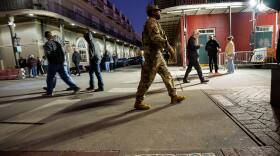More than 80 people in Louisiana have been exonerated after being wrongfully convicted of crimes, according to The National Registry of Exonerations. Calvin Duncan is among them.
As he faced a trial, then prison time for a murder he did not commit, he started to learn everything he could about the law to fight for his freedom.
Duncan and co-author Sophie Cull tell his story in the new book, "The Jailhouse Lawyer." The Gulf States Newsroom's Kat Stromquist spoke to them about the book.
The following conversation has been lightly edited and condensed for clarity.
KAT STROMQUIST:
Calvin, this book details how you learned the law in prison after being wrongfully convicted. But on the way, you helped a lot of other incarcerated people as an inmate counsel or jailhouse lawyer. For people who might not know, what is a jailhouse lawyer?
CALVIN DUNCAN: A jailhouse lawyer is a person that decides to help other people [who are] incarcerated that cannot afford a lawyer, and need legal assistance in proving to the court that their convictions were unconstitutional, or filing a civil rights complaint because they are being refused medical treatment.
And most of the people that's in prison cannot afford a lawyer. So a counsel sub, or jailhouse lawyer, takes on a role as a lawyer to provide that representation.
STROMQUIST: One of the things the book talks about is the difference between a lawyer who works with clients on the outside and your work, representing the very people you were incarcerated with. Can you talk about that difference a bit?
DUNCAN: To me, the big difference is that you're in prison with the individuals, and also you're being or have been affected by the criminal justice system.
Lawyers on the outside, they are actually educated, they went to school. As opposed to us on the inside — the jailhouse lawyers — we had very little education prior to going to prison. We had no education as it relates to going to law school.
Lawyers on the outside actually went to law school and actually practice in a courthouse, whereas a person in prison, we teach ourselves the law. And I think that's the big, big distinction — that we are forced to teach ourselves to law and try to help other people.
STROMQUIST: You taught yourself the law and then you got to law school eventually, right?
DUNCAN: Yes, after I got out of prison, I went to Tulane University, where I did my undergrad. And once I graduated with a paralegal degree, I then applied to law school. And I was accepted at Lewis & Clark [Law School] in Portland, Oregon, where I got my JD.
STROMQUIST: When you guys were working on this book, you sketched in these true-to-life scenes from Louisiana's justice system across decades. You take readers from the now-shuttered House of Detention in New Orleans, to criminal court, to the prison at Angola. What did you guys do to help call up these detailed scenes from memory?
DUNCAN: Long rides to Shreveport. [laughs] Sophie and I,we both worked at the Capital Appeals Project. And we would take these long trips to Shreveport to actually consult and get with the leaders of that community, because there was a Rebel flag being flown in front of the courthouse.
And on these long trips, I would tell Sophie the stories about my journey in prison. Which was really therapeutic for me, because at that time I didn't have anybody to tell these stories to. So that's how they all came about.
STROMQUIST: Sophie, what was it like hearing those stories?
SOPHIE CULL: Calvin is a true storyteller in the tradition of Southern storytelling. He provided so many of the rich details that make up the scenes in the book, and so listening to him, it was like watching a movie on those car rides.
It was incredible to hear not just what he'd been through, and what he had done with his time in prison, but to have him take me inside those walls and really share scenes of his life was remarkable. And I think because I have my own experience in some of those places it also helped me to be able to paint a picture with Calvin of some of those scenes from being in the courtrooms and visiting Angola in my professional life.
STROMQUIST: It's such a vivid picture. The other thing that I was wondering about is, so — a lot of people here in the South are touched by prisons and the prison systems, either through someone in their family or from their own life.
If they were to read this book and get interested in learning the law around their case, how would you suggest they begin?
DUNCAN: First, having hope that you can do it and having the courage to stick with it. And just believing in yourself and believing that you're trying to regain your freedom, and that it's worth the difficulties in trying to do that: learning difficult concepts, accepting you may not get the right judge and some of the judges may not have the courage to do the right thing.
But hope that at some point somebody is going to actually look at your case and give you the relief that you're entitled to, because you weren't afforded a fair trial.
STROMQUIST: This is a really unique subject — your experience, Calvin, rising to law practice after being wrongfully imprisoned. What do you hope people take away from this book?
DUNCAN: I hope what people take away is that there's humans — that we are people — behind that docket number.
Every case is a person behind that case, whether that person is innocent, whether that person committed their crime, whether they committed their crimes under the influence of drugs or previous abuse. That's what I'm hoping, that is, when people read and say that, even like judges and prosecutors, that behind every case is a person. And you should spend time getting to know that individual.
I even take my own story, you know? They were trying to execute me. So what I am hoping is that [when] people think about [a] criminal case — people charged with criminal cases are people. And that there is a story behind each one of those individuals.
And the second thing that I wish that people would take away is that we're all entitled to access to the courts. Everybody. That is a principle by which the founders, the people that developed this country: you're entitled to petition the government when you have been wronged.
STROMQUIST: What about you, Sophie?
CULL: To me, Calvin's story is a story of people banding together in an impossible situation to do what they can to help each other and in helping each other, maintaining hope in our hopeless situation.
And I think we're in a time right now where there are many systems in our midst that feel like they're failing, or that people are desperate for help inside them, and we on the outside don't always know how to help.
And what I've learned from Calvin and from working with him on this story is that the answer sometimes to that problem lies on the inside. And our job is actually to support and empower the work already happening inside those systems; for people impacted to help each other and find their way, with the strength and the creativity and the vision that they already have.
STROMQUIST: A lot to contemplate there. Thanks, you guys, for talking with me.
DUNCAN, CULL: Thank you Kat.
This story was produced by the Gulf States Newsroom, a collaboration between Mississippi Public Broadcasting, WBHM in Alabama, WWNO and WRKF in Louisiana and NPR.











